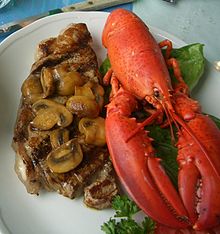Surf and turf
 | |
| Alternative names | surf 'n' turf reef 'n' beef |
|---|---|
| Place of origin | United States |
| Main ingredients | Seafood and red meat |
| Part of a series on |
| Steak |
|---|

Surf and turf, sometimes called reef and beef, is a main course combining seafood and red meat,[1][2] typically beefsteak. While lobster and filet mignon are a standard combination,[3][4][5] variations common to steakhouse menus include prawns, shrimp,[6] squid, or scallops, which may be steamed, grilled, or breaded and fried.
Etymology
[edit]While the term's origins remain unclear, the earliest known citation dates to 1961 in the Los Angeles Times.[1]
History
[edit]In late 19th-century America, combining large portions of lobster and steak was popular at "show restaurants known as lobster palaces," favored by nouveau riche "arrivistes". This became unfashionable by the 1920s and only regained popularity in the early 1960s.[7]
Surf 'n' turf was featured in 1962 at the Eye of the Needle, a revolving restaurant atop the Space Needle in Seattle, Washington.[7]
Surf and turf is often considered to symbolize the middle-class "Continental cuisine" of the 1960s and 1970s,[8] with (frozen) lobster and steak as replacements for the middle class.[9]
In Australia, the dish was first served in 1965 at the Lithgow Hotel (now 7 Valleys)[10] in Lithgow, New South Wales. It is now common throughout Australia.[citation needed]
Sandwich
[edit]A sandwich variation known as the surf and turf burger is prepared with ground beef and various types of seafood, such as lobster, shrimp, or crab.[11][12][13][6]
Reputation
[edit]Surf and turf is often considered as an example of conspicuous consumption and kitsch, as it combines two expensive foods which are not normally considered to be complementary:[14][7]
Surf 'n' turf is an example of the voracious rapture that defines much classic kitsch: adding two swanky things together in hopes of doubling their value and winding up with a flatulent faux pas.
...the point of surf 'n' turf is to maximize hedonistic extravagance...— Jane & Michael Stern, 1990[7]
This meal is stunt food. It exists because it's a way for restaurants to package the two most expensive items on the menu—tenderloin and lobster—into one ostentatious price tag. Otherwise, these two items don't even go together. It's the most conspicuous of conspicuous consumption and maybe even a little cliché.
— Jared Stone, 2015[14]
See also
[edit]References
[edit]- ^ a b "surf and turf". Oxford English Dictionary (Online ed.). Oxford University Press. doi:10.1093/OED/6547615708. (Subscription or participating institution membership required.)
- ^ McGraw-Hill Dictionary of American Idioms and Phrasal Verbs, 2003, s.v.
- ^ Ruhlman, Michael (2001). The Soul of a Chef. Penguin. pp. 184. ISBN 1101525312.
- ^ Stern, J.; Stern, M. (2003). The Harry Caray's Restaurant Cookbook: The Official Home Plate of the Chicago Cubs. Thomas Nelson. p. PT 192. ISBN 978-1-4185-6826-9.
- ^ Billings, C.; Bayer, B. (2014). The Maine Lobster Industry: A History of Culture, Conservation and Commerce. History Press. p. 65. ISBN 978-1-62619-410-6.
- ^ a b Jackson, Kate Morgan (May 20, 2015). "A burger surf and turf". NorthJersey.com. Retrieved July 26, 2015.
- ^ a b c d "Surf 'n' Turf," in Jane Stern, Michael Stern, The Encyclopedia of Bad Taste, 1990, ISBN 0060164700, p. 279-280
- ^ "Obama's Can't-Miss Banquet Menu". www.restaurant-hospitality.com. January 24, 2011. Retrieved 2024-08-14.
Let's see, surf and turf, glazed carrots, double-stuffed potatoes, apple pie — this meal seems to ignore every dietary and culinary trend of the last 30 years.
- ^ Lewis, George H. (December 1989). "The Maine lobster as regional icon: Competing images over time and social class". Food and Foodways. 3 (4): 303–316. doi:10.1080/07409710.1989.9961958. ISSN 0740-9710.
As one moves downward in the American socioeconomic class structure, one sees lobster retain its image as a status foodstuff. To be affordable to the middle class, the actual lobster eaten usually takes the form of frozen Australian lobster tail, often served along with steak as part of a standard middle-class status meal known as "surf and turf." Thus the image of rarity and status is retained, but a cheaper product that has no relationship to Maine... is substituted for the authentic foodstuff.
- ^ Bastow, Ciara (2022-02-24). "The 7 Valleys' knocks expectations out of the park with popular opening". Lithgow Mercury. Retrieved 2024-08-04.
- ^ Keller, H.; Wisner, P. (2015). Burger Bar: Build Your Own Ultimate Burgers. Houghton Mifflin Harcourt. p. 25. ISBN 978-0-544-79168-8. Retrieved July 23, 2017.
- ^ Pilz, D. (2013). Grilling, Grilling & More Grilling. Charlesbridge Publishing. p. 79. ISBN 978-1-60734-661-6. Retrieved July 23, 2017.
- ^ "Surf and turf burger at Morton's in Hackensack". North Jersey. May 11, 2017. Retrieved July 23, 2017.
- ^ a b Jared Stone, Year of the Cow How 420 Pounds of Beef Built a Better Life for One American Family, 2015, ISBN 125005379X, p. 153
External links
[edit] Media related to Surf and turf (dishes) at Wikimedia Commons
Media related to Surf and turf (dishes) at Wikimedia Commons
